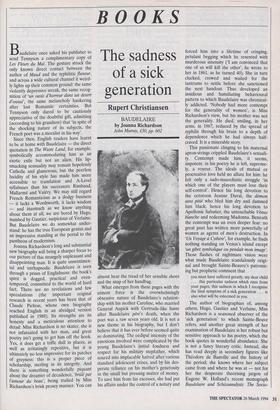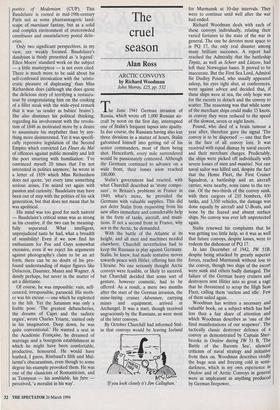BOOKS
The sadness of a sick generation
Rupert Christiansen
BAUDELAIRE by Joanna Richardson John Murray, £30, pp. 602 Baudelaire once asked his publisher to send Tennyson a complimentary copy of Les Fleurs du Mal. The gesture struck the only known direct contact between the author of Maud and the syphilitic flaneur, and across a wide cultural channel it weird- ly lights up their common ground: the same violently depressive streak, the same recog- nition of 'tin oasis d'horreur dans un desert d'ennui', the same melancholy hankering after lost Romantic certainties. But Tennyson only dared to be cautiously appreciative of the doubtful gift, admitting (according to his grandson) that 'in spite of the shocking nature of its subjects, the French poet was a moralist in his way'. Since then, English readers have learnt to be at home with Baudelaire — the direct quotation in The Waste Land, for example, symbolically accommodating him as an exotic exile but not an alien. His lip- smacking sensuality may remain hopelessly Catholic and glamorous, but the peerless lucidity of his style has made him more accessible to translation and A-Level syllabuses than his successors Rimbaud, Mallarme and Valery. We may still regard French Romanticism as a dodgy business — it lacks a Wordsworth, it lacks wisdom — and inasmuch as we know anything about them at all, we are bored by Hugo, numbed by Gautier, suspicious of Verlaine. But Baudelaire we do somewhat under- stand: he has the true European genius and an impressive standing at the portal to the pantheon of modernism. Joanna Richardson's long and substantial new biography will bring a sharper focus to our picture of this strangely unpleasant and disappointing man. It is quite unsentimen- tal and unrhapsodic. Baudelaire is seen through a prism of Englishness: the book's spirit is dogged, practical and even- tempered, committed to the world of hard fact. There are no revelations and few speculations (the important original research in recent years has been that of Claude Pichois, whose own biography reached English in an abridged version published in 1988). Its strengths are its honesty and a meticulous attention to detail: Miss Richardson is no skater, she is not infatuated with her man, and great poetry isn't going to get him off the hook. Yes, it does get a trifle dull in places, as well as irritatingly repetitive, but it is ultimately no less impressive for its patches of greyness: this is a proper piece of scholarship, sterling in its integrity. And there is something wonderfully piquant about the dreamer of decadence, 'brii M par "amour du beau', being trailed by Miss Richardson's brisk prosey manner. You can almost hear the tread of her sensible and the snap of her handbag.
What emerges from these pages with the utmost force is the overwhelmingly obsessive nature of Baudelaire's relation- ship with his mother Caroline, who married General Aupick with Gertrude-like haste after Baudelaire pere's death, when the poet was a raw seven years old. It is not a new theme in his biography, but I don't believe that it has ever before seemed quite so dominating. The oedipal intensity of the emotions involved were complicated by the young Baudelaire's initial fondness and respect for his military stepfather, which soured into implacable hatred after various standard adolescent crises, and by his des- perate reliance on his mother's generosity in the small but pressing matter of money. To save him from his excesses, she had put his affairs under the control of a notary and shoes forced him into a lifetime of cringing, petulant begging which he resented with murderous intensity CI am convinced that one of us will kill the other', he wrote to her in 1861, as he turned 40). She in turn clucked, crowed and waited for the tantrums to settle before she sanctioned the next handout. Thus developed an insidious and humiliating behavioural pattern to which Baudelaire was chronical- ly addicted. 'Nobody had more contempt for the generality of women', is Miss Richardson's view, but his mother was not the generality. He died; smiling, in her arms, in 1867, reduced by the spread of syphilis through his brain to a depth of dependence which he had always half- craved. It is a miserable story.
This passionate clinging to his maternal apron-strings crippled Baudelaire's sexuali- ty. Contempt made him, it seems, impotent: in his poetry he is left, supreme- ly, a voyeur. The ideals of mutual or procreative love held no allure for him: he felt only a sado-masochistic struggle 'in which one of the players must lose their self-control'. Hence his long devotion to the octoroon Jeanne Duval, the demon sans pitie who bled him dry and damned him black; hence his long devotion to Apollonie Sabatier, the untouchable Venus blanche and redeeming Madonna. Beneath the contempt was an even deeper fear: no great poet has written more powerfully of women as agents of men's destruction. In 'lin Voyage a Cythere', for example, he finds nothing standing on Venus's island except `un gibe: symbolique ou pendait mon image'. Those flashes of nightmare vision were what made Baudelaire scandalously origi- nal and brought Sainte-Beauve's patronis- ing but prophetic comment that
you must have suffered greatly, my dear child . . . this particular sadness which rises from your pages, this sadness in which I recognise the final symptom of a sick generation . . . is also what will be esteemed in you.
The author of biographies of, among others, Hugo, Gautier and Verlaine, Miss Richardson is a seasoned observer of the 'sick generation' to which Sainte-Beuve refers, and another great strength of her examination of Baudelaire is her robust but sensitive approach to his poetry, which the book quotes in wonderful abundance. She is not a fancy literary critic. Instead, she has read deeply in secondary figures like Theodore de Banville and the history of the period; she knows where her subject came from and where he was at — not for her the desperate theorising jargon of Eugene W. Holland's recent monograph Baudelaire and Schizoanalysis: The Socio- poetics of Modernism (CUP). This Baudelaire is rooted in mid-19th-century Paris not as some phantasmagoric land- scape of marxisant fantasy, but as a solid and complex environment of overcrowded omnibuses and unsatisfactory postal deliv- eries.
Only two significant perspectives, in my view, are weakly focused. Baudelaire's dandyism is thinly presented as `a legend': Ellen Moers' standard work on the subject — a little masterpiece — is not even cited. There is much more to be said about his self-confessed intoxication with the `aristo- cratic pleasure of displeasing' than Miss Richardson does (although she does quote the delicious story of terrifying a restaura- teur by congratulating him on the cooking of a fillet steak with the wide-eyed remark that it was `as tender as babies' brains'). She also dismisses his political thinking, regarding his involvement with the revolu- tion of 1848 as motivated more by a desire to assassinate his stepfather than by any- thing more disinterested. Yet it was specifi- cally repressive legislation of the Second Empire which convicted Les Fleurs du Mal of offences against public morality and left the poet smarting with humiliation: 'I've convinced myself 20 times that I'm not interested in politics anymore,' he wrote in a letter of 1859 which Miss Richardson does not quote, `yet every time something serious arises, I'm seized yet again with passion and curiosity.' Baudelaire may have been out of step with the politics of his sick generation, but that does not mean that he was apolitical.
His mind was too good for such naivete — Baudelaire's critical sense was as strong as his creative, if the two can be meaning- fully separated. What intelligent, unprejudiced taste he had, what a breadth of sensibility! Even if we now find his enthusiasm for Poe and Guys somewhat excessive, even if we reject his arguments against photography's claim to be an art form, there can be no doubt of his pro- found understanding of major figures like Delacroix, Daumier, Manet and Wagner. A dandy perhaps, but never in the matter of art a dilettante.
Of course, he was impossible: vain, self- centred, irresponsible, paranoid. His moth- er was his excuse — one which he exploited to the hilt. Yet the Satanism was only a feeble pose. 'The greatest debaucheries, the dreams of Capri and the sadistic orgies', wrote Charles Yriarte, 'existed only in his imagination. Deep down, he was quite conventional.' He wanted a seat in the Academie Frangaise, he dreamed of marriage and a bourgeois establishment in which he might have been comfortable, productive, honoured. He would have loathed, I guess, Rimbaud's filth and Mal- larme's obscurantism, even though to some degree his example provoked them. He was one of the classicists of Romanticism, and as Tennyson — his semblable, his frgre — perceived, 'a moralist in his way'.



























































 Previous page
Previous page